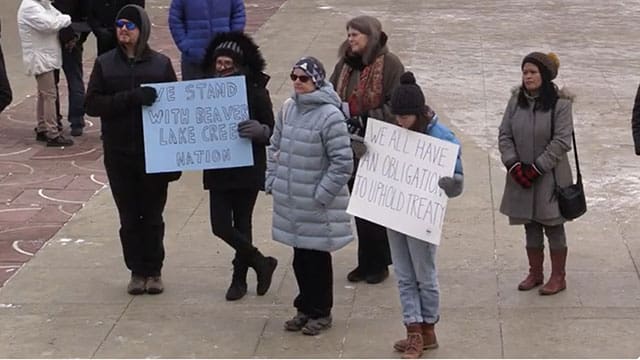Struggling Beaver Lake Cree Nation still waiting for justice after 20 years of legal battles
 There’s an old saying about how slowly the wheels of justice turn. The idea is that while progress may be slow, the results are supposed to be worth the wait. But when you’re caught under those wheels, the experience can be crushing. Just ask the Beaver Lake Cree Nation.
There’s an old saying about how slowly the wheels of justice turn. The idea is that while progress may be slow, the results are supposed to be worth the wait. But when you’re caught under those wheels, the experience can be crushing. Just ask the Beaver Lake Cree Nation.
Since 2008, the Beaver Lake Cree – located northeast of Edmonton – have been fighting a legal battle against the Alberta and federal governments, arguing that their treaty rights under Section 35 of the Constitution are being violated. The Nation claims that industrial development, particularly in oil and gas, has severely impacted their lands and way of life. It’s a case of enormous significance, with potential implications for all First Nations in Canada, but the process has been slow and frustrating.
Beaver Lake Cree Nation’s fight is a symbol of how far Canada still has to go on the road to reconciliation. While the country has made some progress, the Beaver Lake case shows how little has changed for some communities. Their journey through the courts has been arduous, with millions of dollars in legal bills accumulating over the years. The financial strain on the Nation has been so severe that they’ve had to repeatedly ask the very governments they are suing to help fund their legal battle.
To date, Beaver Lake has filed more than 6,000 pages of documentation detailing both the destruction of their lands and their own impoverished state. Section 35 of the Constitution, which affirms the treaty rights of Indigenous peoples, promises recognition and respect, but for the Beaver Lake Cree, these words have felt hollow. Their community continues to struggle with deteriorating housing, inadequate water systems, and a lack of essential services.
The living conditions in Beaver Lake are dire. The Nation has 116 homes, but more than 40 need significant repairs, and another 45 are beyond repair. Nearly 40 families are waiting for a home. On top of that, only 30 percent of homes are connected to the water system, while the rest rely on water deliveries, which are often disrupted when rain makes roads impassable. The infrastructure is equally grim, with more than 40 projects on hold due to lack of funding.
Recently, a glimmer of hope appeared in the form of a ruling by Alberta’s Court of King’s Bench. The court ordered the province to contribute $1.5 million annually towards the Nation’s legal costs, as the case moves closer to a Supreme Court hearing in 2027 or 2028 – 20 years after it was first filed. The federal government, for its part, voluntarily contributed $2.6 million to the litigation fund, but it took legal action to get Alberta to follow suit. Alberta had insisted that the Beaver Lake Cree prove they were “impecunious,” or too poor to cover the costs, despite the Nation’s obvious financial distress.
Alberta Cout of Queen’s Bench Justice Bonnie Bokenfohr ruled in favour of the Beaver Lake Cree Nation, stating that this was one of the rare cases where failure to award advance costs would “participate in an injustice.” Yet, even with this ruling, Beaver Lake must still contribute $150,000 annually to the legal battle – a daunting sum for a community already facing $150 million in urgent infrastructure needs.
For many Canadians, reconciliation is a buzzword often referenced in political speeches. But for Beaver Lake, it’s a distant reality, buried under years of legal wrangling and financial strain. The community’s experience raises a troubling question: why are governments so slow to act on clearly defined constitutional obligations? Living up to Section 35 should not require decades of legal battles.
The conditions in Beaver Lake are a national disgrace. As Canadians, we should be asking why governments continue to drag their feet on fulfilling promises made to Indigenous communities. Justice, in theory, may grind fine, but for Beaver Lake, it has ground far too slowly. The time for meaningful action is long overdue.
The Alberta Court of King’s Bench ruling makes for instructive reading.
Bill Whitelaw is a director and advisor to many industry boards, including the Canadian Society for Evolving Energy, which he chairs. He speaks and comments frequently on social licence, innovation and technology, and energy supply networks.
For interview requests, click here.
The opinions expressed by our columnists and contributors are theirs alone and do not inherently or expressly reflect the views of our publication.
© Troy Media
Troy Media is an editorial content provider to media outlets and its own hosted community news outlets across Canada.

